#mathilde's engagements
Explore tagged Tumblr posts
Text
A quiet and sunny Safin/Mathilde Sunday
🍵❤️🌞

We wish you from the Greek capital Athens, where we start our engagement trip through Greece and the whole of Europe…
a quiet and very sunny beautiful Sunday to all of you with nice tea time with your loved ones
Lots of kind regards from us
Lyutsifer and Mathilde 💞❤️❤️
@daughterofthesilmaril @esconognosia @thefluffiestseahorse @chevy2497 @ramicastiel @ellen-the-radiant @ellen-the-wise @moon-stars-soul @sakurasoulgeneral @ghoulsister1 @squidwujun @satanhauntedourfears @bearbruno14 @grumpyoutlaw @silverlambcaptain @neverendingstories00 @honestmysteries @one-boring-person @poptod @koshi-sama @padawansubscription @sapphicsandsupernatural @yagurlny @chieftyphoonchaos @villainworshiper @alessiathepirate @colourful-serendipity .
#safin sunday#lytsifer and mathilde engaged#lyutsifer safin & mathilde swann#lyutsifer safin#the safin family
5 notes
·
View notes
Text
BELGIUM - Frédéric Van Espen, Claude Noterdame & Alain Tholl de l'Enclos
Starting with the current Queen's hairdresser, Frédéric Van Espen steppend into the position in 2013, just before she became Queen of the Belgians, and has been styling her for national and international events since then. He has also worked with Elisabeth and Eléonore.


He's the owner of Didier & Rosalinde hair salon in Brussels, but he usually works wiith Mathilde in the private quarters at Laeken Castle. Looking at the website and portfolio you can see the similarities of his other works and what we've seen on Mathilde for a while:

I found an interview on the occasion of his 10th anniversary as the Queen's hairdresser where Frédéric gave a lot of detals of his work with Mathilde, even how it all started (second link below). According to what he said to HLN he's good friend with Edouard Vermeulen at Natan and he recommended him to Mathilde's team because her previous hairdresser was quitting.
His very first work was for Willem-Alexander's enthronement events, a tiara event to launch his career as the Queen's hairdresser, and not a simple gala, but an event for history books. I gotta confess that even if it's not an updo, Mathilde's hair on the day of the entronement it's one of my fave looks on her and I do see a change in style from the previous years.



Frédéric talked about how sometimes is dissatisfied with his work and that he notice little mistakes and is concerned about the outcome but that Mathilde reacts light-heartedly with a "Oh, that happens!" and I think that's the most on-brand Mathilde.
He also stated that when there are public events, he styles Mathilde at 7AM at Laeken, but on the occasional time, she goes to his salon and they have a private box for high profile clients such as her or, surprise, Prince Laurent. Frédéric also talked about when there's a state visit or during national day, he goes to the palace several times because everytme Mathilde changes clothes, he match the hair with the outfit, or when there's a trip abroad, he works on the plane in the stewards cabin without a mirror (talk about trust).
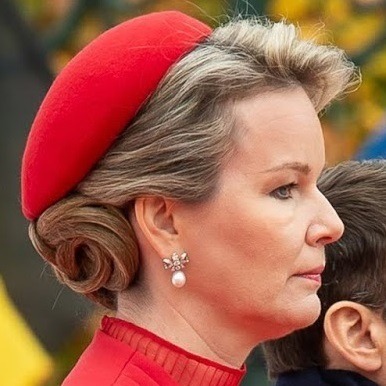

While he talks about what Mathilde likes, he says that she likes to stick to her classic style, but that Elisabeth now that she came of age give him more room to experiment. This interview was made 2 years ago, and I can't assure that he always does Elisabeth's har, but because she isn't a full-time working royal and her events are pretty limited, it's pretty safe to say that he's the one behind her two tiara appearances.


And I don't want to end this post without mentioning Paola's two known hairdressers: Claude Noterdam and Alain Tholl de l'Enclos. While Alain is also mentioned as her hairdresser, my guess from what I actually found, is that Claude was her main hairdresser for about 40 years. He was the owner of Maison Roger in Brussels and in 2016 he stepped down handing the salon to Alain and that's why he is also mentioned, because of the conection to Maison Roger.
Claude Noterdame started working with her when she was newly engaged to Albert, so he was the one behind those big updos we all liked (because we do agree that she had the best hair of her generation of Queens, right?)


He said that she visited his salon at least once a week, but when she couldn't he went to work at Belvédère Palace. He also accompained her to visits to the United States of Lebanon.
I actually found a small interview that RTL did in 2017 with Claude where he shows an archive of pictures of her updos that I would kill to see for myself and he also keeps pictures of a young Claude with Paola in different gatherings. It's in french and I understand just a little bit. Here it is in case you want to see those pictures and him talkng for 5 minutes:
Of course there's less information about the older generation's hairdressers, or at least is harder for me because of the limited resources in languages I don't speak (you should see me translating the dutch interviews hahaha). But at least there's something to offer you in these series of royal hairdressers.


To close this belgian edition,, I found a few titbits about Alain: he also styled Mathilde (probably before Frédéric came into the picture in 2013) and Princess Claire. He also works with Princess Laurentien of The Netherlands and both ladies usually have their hair done like any other client in the salon. He also stated that when they're in Belgum, he styles Princesses Marie Astrid and Margaretha of Luxembourg and Hereditary Grand Duchess Stéphanie.
Sources: x x x x x x
#royal hairdressers#belgian royal family#queen mathilde#princess elisabeth#queen paola#frederic van espen#claude noterdame#belgium
63 notes
·
View notes
Text
Sudan’s rival generals have ignored warnings of mass starvation. In more than a year of brutal war, the two military factions have weaponized humanitarian aid.
Sudan’s de facto leader, military chief Abdel Fattah al-Burhan, has blocked aid into at least half of the country under the control of the paramilitary Rapid Support Forces (RSF) headed by Mohamed Hamdan Dagalo, known as Hemeti. Meanwhile, the RSF is obstructing trucks into places held by the Sudanese Armed Forces (SAF). Local volunteers running soup kitchens have been targeted and killed by the RSF, particularly in Khartoum, Sudanese aid workers told FP.
The conflict has created the world’s largest hunger and internal displacement crises. The fighting has pushed 25 million people, more than half the nation’s population, into acute hunger and forced about 11 million people to flee their homes, including 2.3 million who fled abroad. More than two million Sudanese could die by the end of this year, aid agencies warn.
In areas where there is food available, extortion and attacks on traders at checkpoints have raised prices. Women have recounted having sex with SAF soldiers in exchange for food. Reports of torture, rape, the use of children under 15 in the fighting, and ethnic-based massacres by the RSF and armed militias have surged over the past year.
“People are dying of hunger in the capital,” said Mathilde Vu, the Norwegian Refugee Council’s advocacy advisor in Sudan. “We are looking at the risk of starvation being used as a weapon of war. … This needs to be monitored. The policymakers already have a tool for that. The U.N. Security Council resolution about conflict and hunger, and what they need to put in place is a monitoring of that.”
Both sides in Sudan’s nearly 17-month civil war have committed “harrowing” abuses that may amount to war crimes, a U.N.-mandated mission reported on Friday, calling for a countrywide arms embargo. Sudan’s military government rejected a proposal by U.N. experts to deploy a peacekeeping force to protect civilians.
Compounding the situation, the humanitarian response is critically underfunded. A $2.7 billion U.N. appeal has been just 32 percent funded. Much of that funding has come from the United States. However, aid agencies say local volunteers on the ground need to be better supported since a cease-fire is highly unlikely in the immediate future.
Famine was declared in Zamzam camp housing about 500,000 displaced people near the besieged city of El Fasher, the state capital of North Darfur—areas where the RSF is blocking aid trucks. There’s a realistic chance of famine in 16 other areas, Vu said, but precise figures are hard to confirm. Last month, the SAF agreed to open the Adré border crossing from landlocked Chad into Sudan, for a period of three months. But international aid agencies told FP that the SAF has made things difficult through lengthy authorizations ensuring only a trickle of shipments gets in.
U.S. envoy for Sudan Tom Perriello visited Saudi Arabia, Egypt, and Turkey this week in the latest attempt by the Biden administration to expand humanitarian access in Sudan, following failed peace talks in Geneva. The conflict risks turning into a forever war, in which various external actors seize the opportunity to extend their influence. Turkey, Egypt, the United Arab Emirates (UAE), and Russia have been accused of arming warring parties.
While such negotiations are essential, U.S. attention and pressure should also focus on other regional powers with a vested interest in the conflict such as Eritrea and Ethiopia. Foreign mercenaries from Chad, Mali, Niger, the Central African Republic, and Libya are believed to be fighting in Sudan.
Pressuring regional powers could engage local armed militias allied to the warring parties in ultimately ensuring access to places like El Fasher. “It will create more of a buffer than two guys signing an agreement in Jeddah” and then breaking it, Vu said. “You cannot bypass the regional powers. … They really are the ones who have the leverage. It’s very important that Western powers engage them so that they have a constructive role in this crisis rather than a harmful one,” she added. Even if Burhan and Hemeti signed a peace deal, many of the local armed groups involved would likely not abide by it.
Both generals have held meetings with several African leaders, while the African Union has been largely absent in peace negotiations. More recently, Burhan held meetings with Eritrea’s president, Isaias Afwerki, and Ethiopia’s prime minister, Abiy Ahmed, at the China-Africa summit.
69 notes
·
View notes
Text
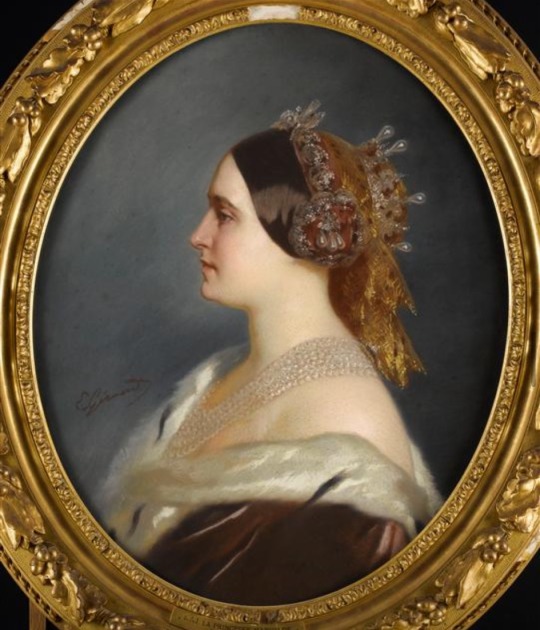
Princess Mathilde Letizia Wilhelmine Bonaparte, born May 27, 1820 in Trieste to Catharina of Württemberg and Jérôme Bonaparte
She got engaged to her cousin Louis Napoléon ( future Napoléon Ill) in 1835 without this marriage project succeeding. She became the first house mistress of the Palais de l'Elysée from 1848 to 1852.
#Mathilde Bonaparte#jerome bonaparte#catharina of Württemberg#second french empire#napoleonic era#history#art#napoleon
7 notes
·
View notes
Text

I finally watched the 2023 French fanfic of my favorite book, i.e. The Three Musketeers: Milady, part deux of Martin Bourboulon's two-part adaptation of the Alexadre Dumas' novel. I talked about part 1 - The Three Musketeers: d'Artagnan - earlier, but I like to think of them of them together as one oeuvre, since they were shot as one film and then split into two cinematic releases.
Those of you who know me, understand by now that my movie reviews predominantly judge these movies not as standalone works of cinema but as adaptations. I don't ever ask for historical or canonical accuracy (which I have long ago accepted is much too much to ask for), but what I look for is that the plot and the characters serve the underlying spirit of the original Dumas novel. And perhaps this is why, more so than with other - admittedly much more terrible - adaptations, this one just makes me blind with rage. I don't know when filmmakers decided that how we like our morally gray characters is somehow justified, redeemed, and generally de-clawed. If what they were going with here was to make Milady de Winter, the murderous villainess of the novel, into some kind of a post-feminist hero, then they have failed miserably. (Lots of spoilers below the cut)
I don't usually feel the need to put SPOILER warnings on adaptations of the 3 Musketeers, but this ones veers so far off plot that I'm putting it here just in case.
Let's start by saying that it is certainly not Milady who is the main villain of these movies. It's not even Cardinal Richelieu, the man who seems to pull her strings. Rochefort, sadly, does not even appear in this adaptation, and honestly, I feel like docking a point just for that. Apparently M. Bourboulon decided that Dumas' masterpiece just wasn't interesting enough on its own, so he felt the need to "beef" it up, i.e. rewrite the narrative by taking out critical characters like Rochefort and Lord Winter and substituting them with new characters like Mathilde (Aramis' knocked-up sister), Benjamin (Athos' Protestant!!! brother) and maligning poor Gaston le duc d'Orleans by making him the main villain of the duology. Which is a damn shame, because these were all one-note characters foisted upon us at the expense of delightful assholes who made the original novel so fun to read.
And that goes for all the main characters here, including the titular Milady herself. Book!Musketeers are young, reckless assholes, who wench, fight, gamble and generally engage in very questionable behavior. You know, "boys will be boys" - and I do mean that with every possible connotation, i.e. they're horrible. By taking away their youth (excuse moi but Vincent Cassell, who plays Athos, is in his 60's LMAO), Bourboulon would have stripped their bad behavior of any of the benefit and charm of youth. So, I guess, Bourboulon decided to get rid of the bad behavior entirely, instead. Other than Porthos having an occasional bisexual threesome (bless), and Athos drinking while brooding, we don't really see any of the musketeers being the delightful assholes that I, for one, expect them to be. Strip away everything else, but do not ever take the assholery away from me! Here, they are old and they are boring, and honestly, it makes absolutely no historical or narrative sense that any of them are still in the service.
As for d'Artagnan, our hero, he is painted with such a chaste and faithful brush that I'm not actually sure - is this the same shithead who in the book fucks Milady's maid so that he can pretend to be Milady's boyfriend in the dark and sleep with her without her consent??? Hm... nope. This d'Artagnan is so faithful to his Constance, even though they barely touched hands, that he rebuffs Milady's (very assertive) attempts at (inexplicably) seducing him. Oh dear, oh dear, you might say. How is she supposed to spend the rest of the movie trying to get her revenge against him for raping her? Oh, that's right. She's not!
This Milady is no villainess but she's certainly no post-feminist heroine either. Her backstory is so cliche, it is for to weep, and I raged and ranted at great length about it here. She was forced to marry at 15! To some unnamed man who beat and raped her! And whom she killed - a totally justifiable homicide - before somehow falling in love and marrying Old Man Athos and bearing him a child (future Mordaunt? I see you, cutie!). But alas, Old Man Athos learned of her past crime - because she told him - and turned her over to the authorities, resulting in her being branded (natch) and then hanged (convenient how Athos doesn't actually get his own hands dirty). This Milady has literally Never Done A Thing Wrong. Since there's no Lord Winter, there's no poisoned husband. She never succeeds in killing Buckingham or having him killed. She never tries to even so much as look at d'Artagnan wrong, in fact, they keep saving each other's lives for Reasons of the Narrative, none of them particularly compelling. And finally, our poor Constance, I was really rooting for her to survive this AU, but alas. She ends up once again doomed by the narrative, but so stupidly, that I honestly don't know what to say. It made absolutely no sense for Queen Anne to hide her in England with the Duke of Buckingham since doing so would have implicated her in both treason and adultery. BUT WHAT IS LOGIC? Anyways, suffice to say, it's not Milady's fault that Constance ends up dead in d'Artagnan's arms by the end of the movie.
Don't get me wrong. This Milady is very hot (she is played by Eva Green, after all). But there's really nothing interesting or compelling about her as a character. She's a survivor, determined to survive. WHICH SHE DOES. Yay, it's a Milday-is-alive-at-the-end AU! And, honestly, good for her. By all means, girl, you kill that old man who betrayed you and handed you over to be hanged! He doesn't deserve you! And you abduct your own son and smuggle him out of France to teach that old man a lesson! But for the love of all that is holy, can you please, PLEASE raise him to be at least a tiny bit evil???? Please???
I am begging, can we just let villains be villains? Milady's original character was so much more fabulous not because some man beat and raped her but because of her ability to bend men to her will and whim throughout the novel. She outwits and outmaneuvers all of our "heroes," leaving a titillating trail of bodies and broken hearts in her wake, and it takes TEN MEN in the end to hunt her down and execute her. And listen, Athos spends the rest of his life trying to atone for it. THAT IS HER POWER. This Milady? Blah. And while we're here, this Athos? Double blah. I don't care, let her kill him. There's absolutely nothing interesting about this man. (And yes, I think hanging your wife for lying to you and then becoming a murderous alcoholic about it is very interesting, Athos. Very interesting, indeed.) I'd rather watch Vincent Cassell in Eastern Promises 20 more times - now THAT was a character worth his acting skill!
As for the movies themselves, it's sad to say that the only time both my wife and I felt ANY level of investment was close to the very end, when we were waiting to find out whether Constance was going to die. And most of that was due to the extremely convoluted narrative bending that defied logical sense and occasionally space and time. We did not give a shit about anything else, which does not, generally speaking, a great cinematic experience make. And where Part I at least gave us a few moments of levity and a great win for humanity in bisexual Porthos, Part II is merely dark, drab, and joyless.
Final grade for both parts: I give it a C- as a film and a D as an adaptation, in which the only thing that saves it from being an F is Eva Green's hotness.
#the three musketeers: milady#the three musketeers#2023 the three musketeers#alexandre dumas#my life is but a vale of disappointment
14 notes
·
View notes
Note
Who from the Wittelsbach siblings do you think had the happiest marriage and who do you think had the unhappiest marriage, in your opinion?
I think Karl Theodor & Maria Josepha had the most happy marriage, while the least happy marriage was a tie between Maria Sophie & Francesco and Mathilde Ludovika & Louis.
Hello! Sorry for the wait. Although I can’t help but find the seventeen years age gap between Karl Theodor and Marie José icky, it does seem they were happy together. Out of all the siblings they seem to have had the most functional marriage for sure. Karl Theodor also had a good marriage with his first wife Sophie, though it was sadly a short one.
Helene and Louis both married for love to people beneath their status, though I can’t really say for sure how happy their marriages actually were. In Helene’s case simply because I haven’t found any sources that describe how her relationship with her husband Maximilian was, but given how deeply affected she was by his untimely death, I think it’s safe to assume it was a happy union.
In Louis’ case, we know that Elisabeth once told her lady-in-waiting that “It is a good thing that Henriette is his wife, for anybody else would long since have left him, and he is happy with her.” Valerie also wrote in her diary in 1884 that “Good Aunt Henriette is here and will stay until Saturday... When the attacking Uncle Louis isn’t around, Aunt is much more pleasant.” It seems that as he grew older Louis developed an erratic personality and was fit to burst of anger out of nowhere, which likely troubled his relationship with his family. I always trash Marie Larisch’s memoirs for being so unreliable, but I actually believe there is truth is this anecdote she recalls of going with her parents to the Opera in Vienna as a teenager:
during the ent’racte I whispered to papa that I should like something to eat. But I was not prepared for the wrath which followed this simple request. “Another word and I will box your ears,” he hissed. “How dare you be hungry at the Opera! And if you are, listen to the music and feed on its beauty.” I tried to follow his advice, but I felt really sinking, and although I adored the Opera, I was very glad to get back to Schönbrunn and supper.
I only can hope that these lapses in his personality didn’t occure too often.
My unpopular opinion is that I don’t think Marie and Francesco’s marriage was as miserable as it’s often assumed. While she did have a bad start with her husband, it seems that from 1868 (the year of their “reapprochment” aka when they started to sleep together regularly) onwards they had a good relationship. I just haven’t come across anything that really supports they didn’t get along in their old age. The only thing I’ve seen used as evidence of them being in “bad terms” is that Marie traveled alone often but so did Elisabeth, and no one argues that she and FJ hated each other because of that. Also Francesco II’s health was bad since the 1880s, so it’s not that weird that he couldn’t accompany his wife in her trips anymore (since he did travel with her to England in the 1870s).
Mathilde and Luigi were the most disfunctional marriage hands down, they had problems from the very beginning and their relationship only got worse as the years went by. They had been informaly engaged since Marie’s own marriage, and ok at the time it seem like a good idea to marry both sisters to the first and second in line of succession princes of a Catholic kingdom. But frankly they should’ve call it off after the Bourbons were deposed because the marriage promised no economic security to Mathilde, and even less personal happiness. Luigi got publicly drunk constantly, was unfaithful, and completely broke. On her older age Mathilde lived separated from her husband and after his death she had to depend on Elisabeth for support.
That being said, my answer to whom I think had the worst marriage is always going to be Sophie and Ferdinand d’Alençon, mainly because he had her locked up in a mental institution for months after she tried to divorce him. Which to me tops literally any other bad thing that anyone else on this post ever did to their spouse. But at the time everyone saw it as the right thing to do to “save” Sophie from herself, which is just sad.
Thank you for your question!
#fun fact it seems marie's husband francesco was the one who introduced karl theodor and marie josé?#i recall reading they met at his place#karl theodor duke in bavaria#maria josé of braganza duchess in bavaria#duke ludwig wilhelm in bavaria#henriette mendel baroness wallersee#helene in bavaria hereditary princess of thurn und taxis#maximilia hereditary prince of thurn und taxis#queen marie sophie of the two sicilies#francesco ii of the two sicilies#mathilde in bavaria countess of trani#luigi of bourbon-two sicilies count of trani#sophie in bavaria duchesse d'aleçon#ferdinand d'orleans duke of alençon#asks
14 notes
·
View notes
Text

“Stop speculating about royals’ sexuality just because someone claims to know someone who knows them. Y’all been watching too much Young Royals. If they decide to disclose it to the public, good for them, but remember that Philippe was rumored to be gay for the longest time until he showed up out of nowhere engaged to Mathilde.” - Submitted by Anonymous
21 notes
·
View notes
Text



From Lady's Own Paper 1866-1872:
As ur readers are aware, the opening night of Messrs. Gye and Maplegon’s season at Coventgarden, on the 29th ult., was distinguished, contrary to precedent, with an important debut. The opera was Lucia di Lammermoor, and the debutante Mdlle. Sessi, whose career in Paris awakened so much interest, and whose fame of voice and of wonderful hair was borne hither by French journals and stray visitors to the Italiens.
Mdlle. Mathilde Sessi is an Austrian, or, as one might almost say, AustroItalian singer, her birthplace being Trieste. She commenced her public career, we believe, in Germany, but has also sung in Italy, and quite recently in France, where, at the Paris Opéra Italien, she had to fill the place (no grateful task) of Madame Adelina Patti during the engagement of that wonderfully popular artist at the Imperial Opera in St. Petersburg. That she should have succeeded in doing this with a certain amount of credit says no little in the favour of one as yet necessarily inexperienced. Like Adelina Patti, however, Mdlle. Sessi—a pupil, we understand, of Herr Maurice Strakosch — has enjoyed uncommon advantages. At any rate, judging from her first night’s performance in Londen, her essay before the most difficult, because, perhaps, the most blasé, audience in Europe, was one of such promise that we can safely predict for her an honourable career. Let us say at once that Mdlle. Sessi shines fir more as a singer than as an actress ; but, calling to mind the many notable instances of operatic aspirants who began by singing more or less well, and took long years to master that scarcely less essential accomplishment which leads to undisputed eminence on the lyric stage, we have no reason to doubt that time will bring what is at present wanting to the dramatic side of her art.
She is a blonde of the Teutonic type, with a profusion of golden locks, which quite obviates the necessity of “ Lucia” in the mad scene having to be “chignonified.” It is a hard necessity for all prime donne who have to go mad on thie stage to let down their back hair, if they have any, and if not, they must resort to the property coiffeur ‘for tails. It is equally imperative that a lunatic heroine should be dressed in white. The cheveluwre of Sessi here in the Insane scena made as marked a sensation as it has done in Berlin, in Frankfort, and in Paris ; but the talented little lady is entitled to higher consideration than that based on the luxuriant length of {her hair. She has a bright, pure soprano voice, of good compass, capable of expression to a degree not yet reached by its owner, and flexible enough for any reasonable purpose. On the whole Mdlle. Sessi uses it well. Her execution of the florid music abounding in Donizetti’s opera was marked by neatness and accuracy of intonation. Though free from the vibrato as a vice, she can employ it as an ornament withyeth and, what is more than all, she sings with intelligence. Thus endowed, it was not surprising to find Mdlle. Sessi at once in favour with her audience. Her progress during the evening was steady, and at the climax, in the music of the third act, the new comer had secured a position.
The opera selected for her first appearance before the most critical audience in the world was what, under any other than exceptional circumstances, might fairly be styled the “hackneyed ” Lucia de Lammermoor. But only let some new prima donna of capacity be put forward as the heroine, and Donizettis Lucia invariably proves attractive, the opening night of the present season being certainly no exception to the rule. Since then, in two further representations of the wellknown opera, Mdlle. Sessi has maintained, and, indeed, may be said to have improved, her position. Nevertheless, it is rather in comic than in serious operas that the talent of the fairhaired Austrian songstress is said to lie, and of this an opportunity was afforded her admirers of judging on Thursday night last, when Donizetti's Figlia del Reggimento, which had been got up expressly for Mdlle. Sessi, was _ performed. As, however, we were compelled to go to press some hours before, we are unable to state the result in this article. On Saturday (to-night) she appears as the “Queen of Night” in Mozart's Flauto Magico, the music of which the compass of her voice should enable her to render most effectively.
In referring to her début the Times remarked: “She has even now both earnestness and intelligence ; but more than this is indispensable to make a genuine actress, and it remains with herself to acquire the rest. Mdlle. Sessi is petite in stature ; nor does her facial physiognomy appear to lend itself with readiness to mobility of expression. Admitting this, however, together with other physical conditions, apparently drawbacks, there remains an indefinable something which justifies a belief in future progress. ee Sessi’s voice is a pure soprano, especially telling i ae higher register, and therefore favourable to the ¢ pr tive enunciation of such music as that which Don has put into the mouth of his romantic herome.
From The Musical World 1870-04-09: Vol 48 Iss 15:
“It was in the Lucia of the evening, however, that the interest of the public was above all centred. We have heard so much of Malle. Sessi’s golden hair, and have been kept so well informed by foreign journals of the excellent jualities of Mdlle. Sessi's voice, that the effect she produced last night, personally and artistically, had nothing in it which could, strictly speaking, be called surprising. We were prepared for a success, and a success was indeed achieved. Mdlle. Sessi’s hair is long, plentiful, and beautifully fair, while her voice is extensive, sympathetic, and something more than fair. It is, indeed, a soprano voice of the purest and finest quality; deficient perhaps in power, but certainly not wanting in sweetness. Without following Malle. Sessi too closely through the various pieces in which Lucia takes part, we will simply say that she sang the cavatina of the first act gracefully, and that she was becomingly sentimental in the well-known duet which closes that act ; that she again distinguished herself in the dramatic duet with Ashton, and above all in a well-developed and highly dramatic concerted piece which forms so effective a termination to Act 2; but that it was not until Act 3 that she displayed all her hair, and with it all her power. Not that the force of Malle. Sessi resides (Samson-like) in her hair alone; but personal appearance is always something in a prima donna, and if the back hair is to be let down at all, it is well, no doubt, it should be bright and beautiful. For this mad scene Malle. Sessi had also reserved her voice, which, alike resonant and flexible, seemed to lend itself easily to the feats of ‘agility’ required by a due performance of the music. In fine the débutante made a success. The audience appreciated her, applauded her, and (what is sometimes even more important) appeared to like her.”
“ Nobody acquainted with what goes on in the artistic world of Paris needs information about the antecedents of Mdlle. Mathilde Sessi. How she recently succeeded in making for herself a good position in the French capital, and among those who boast that they are hard to please, is pretty well known. Mdlle. Sessi came to us, therefore, with a certain character to sustain, and with the task before her of having to satisfy decided expectations. Let us say at once that she has done both. Her choice of a work was well advised. Lucia di Lammermoor is familiar and popular ; its music proved thoroughly adapted to the new-comer’s voice and style; and the work secured an incidental advantage which, though trifling, must not be overlooked. The fame of Malle. Sessi’s hair is nearly as great as that of her voice. In Paris the ‘glory’ of the young Austrian has not been her least attraction; and who can tell how many in the crowded audience of last night waited impatiently for the. mad scene which was to display its full extent? These were not disappointed, if there be anything in luxuriant growth and uncommon length. Malle. Sessi’s hair is a decided feature in her representation of Donizetti’s distraught heroine. As a singer, the débutante was not long in finding favour. Her opening phrase was somewhat marred by the nervousness incidental to her position ; but towards the end of ‘ Regnava nel silenzio’ it became evident that an artist of no ordinary kind was in presence. Malle. Sessi has a pure soprano voice of bright quality, fairly sympathetic, and free from the vibrato which constitutes the fushionable vice of singers now-a-days. Moreover, her voice has considerable compass and flexibility. So far the new-comer is well endowed ; and of her endowments she appears to have made much, if not the most. Her phrasing affords as little reasonable ground for complaint as do the precision and neatness with which she executes rapid passages. The latter merits were, of course, most evident in the ‘mad music,’ which was given with a success not unworthy of comparison with that achieved on the same stage by other artists. As regards expressive power, it can hardly be supposed that Malle. Sessi has attained her maximum. She has reached just far enough to warrant a hope that she can go further. As an actress, some may hold that Mdlle. Sessi falls short of what she is as a singer. They may say, for example, that her features lack mobility ; but it can no more be denied that they are always agreeable to look at than that, in other respects, physical disadvantage is amply counterbalanced. It must be said, however, that throughout the scene of the malediction, Mdlle. Sessi showed, at most, but a promise of future dramatic excellence. Happily, her career is all before her, and that promise may be fulfilled. The young artist, as we have hinted above, was quite successful in winning the favour of her audience. Called on after each act, she was frequently applauded with an enthusiasm about which there could be no mistake.”
The directors followed up the production of Mdlle. Sessi on the opening night by playing Les Huguenots on Saturday, in order that Herr Wachtel might appear as Raoul, for the first time in England. This is vigorous work ; and shows pretty clearly that Covent Garden means to make an impression while yet it has everything its own way. The public are not likely to grumble in consequence, for they will reap advantage, whatever may be the resultant good or ill fortune of the housa. There was a crowded audience to hear the second, and, as not a few think, the greatest of the triad of great works which, written in Meyerbeer’s prime, will carry Meyerbeer’s name down to posterity.
From Dwight's Journal of Music: a Paper of Art and Literature 1870-07-30: Vol 30 Iss 10:
[...] We have had a new seconda donna—Mlle. Olma; a new contralto—Mlle. Cari; a new tenor—Signor Vizzani ; a new comprimaria—Miss Maddigan ; and anew prima donna assoluta—Mlle. Mathilde Sessi. The seconda donna is so completely a novice that th The soprano (Mlle. Sessi ), although at present little of an actress and hardly a singer of the first class, has done valuable service. Mile. Mathilde Sessi, if she does not warrant theithusiastic laudation of French critics, boasts undeniable qualifications. Much has been said and written about her profusion of fair hair, the charm of which, unlike that of Horace’s Pyrrha, is not so much in the binding up as in the letting loose ; but she has other things besides an abundant natural head-dress to recommend her. Hor voice is of agreeable quality, especially good in the up~er tones, and flexible enough to cope with the most elaborate passages of the Italian school. The music of Donizetti seems to come to her quite naturally. Her most effective display, vocally considered, is that of Lucia’s madness, her least effective, perhaps, that of the signing of the contract. Without going into further details, we may add that the impression created by Mlle. Sessi has been generally favorable. She does not shine as an actress ; nor are her personal endowments such as to lend poetical illusion to the scene. That she is small in stature, however, says nothing—Mme. Patti and Mlle. Lucca being equally under the middle size; but there is q want of mobility in her features, which under all circumstances wear a stereotyped expression. Though by no means over-well supported by her associates, Mlle. Sessi on the night of her first appearance was received with every token of encouragement.
The few words of criticism we have given to her Lucia may apply with equal fairness to the various parts she has since essayed, ample as they prove her title to consideration. It hus been asserted that Mlle. Sessi shines more in comic than in serious opera. We confess our inability to see the distinction. She has no histrionic genius; and, were it not that neither actually represents anything, her comedy might be tragedy and her tragedy might be comedy. As Maria in La Figlia del Reggimento, or as Norina in Don Pasquale, her physiognomy is as perversely immobile and her gestures are as perversely conventional as in Lucia, Astraffiamante, or Ophelia. Yet about Mile. Sessi’s versatility there cannot possibly be a question. Every part seems to come ready to her hands. She has not only successfully essayed the characters we have enumerated, but has added to them the lachrymose Violetta of Verdi’s Traviata, and the lively Susanna in Mozart’s Nozze di Figaro —furthermore, on a recent occasion, appearing substitute for Mme. Adelina Patti, as Zerlina, in Don Giovanni, and issuing from the ordeal with untarnished laurels. That Mlle. Sessi will ever be an actress is hard to believe ; dramatic instinct seems to be denied her; but that she has the means of becoming, with perseverance, a singer of almost, if not absolutely, the first class, we are convinced. It has been within the province of few to execute the difficult bravura music of the “Queen of Night,” in Mozart’s Flauto Magico, and that of the operas of the modern Italian school with equal facility. Such, nevertheless, is Mile. Sessi; and as such it behoves amateurs to watch with interest her future career.
Her almost only chance of new distinction this season has been afforded by Meyerbeer’s Dinorah, in her assumption of the demented heroine of which, Mile. Ilma di Murska excepted, she is unrivalled. To Mile. Patti rather than to Mlle. Sessi—who, by the way, has been taking from her many of her best characters, Lucia, Norina (Don Pasquale), and Maria (Za Figlia del Reggimento) among the rest—should have been assigned the part of Ophelia, as to the only singer who had a chance of equalling, if not, indeed, of surpassing, the remarkacle inpersonation of Mile. Christine Nilsson, and thus of keeping upon the stage of Covent Garden (it cannot be given at Drury Lane, being the exclusive property of the rival theatre) the grave and elaborate opera of M. Ambroise Thomas.
Mlle. ‘Tietjens is now what Mlle. Tietjens has been for some time—in certain respects the finest dramatic singer on the stage. It is no little to say of her that, when she retires, such operas as Fidelio and Medea must inevitably be laid upon the shelf. That this unquestionable great artist should have made herself so common by singing in and out of season is much to be regretted ; and if she forms no longer the popular attraction she used to be it can only be thus explained. Mlle. Tietjens, however, has earned new honors recently by consenting to play the part of Gertrude in Humlet—one undeniably of the first order. Last year, it is true, the Ophelia was Mlle. Nilsson; this year it is Mlle. Sessi: but Mlle. Tietjens, in her own department, that of high tragedy, had as little to fear from Mlle. Nilsson as she had to fear from Mlle. Sessi. We have no wish to probe the question farther. Enough that Mlle. Tietjens now represents the Queen, and represents it so admirably that she not only creates the strongest impression, but, in one scene (the great scene between Hainlet and his Mother), almost, by force of example, makes an actor of Signor Cotogni—the Hamlet of the period.
From The Musical World 1871-04-08: Vol 49 Iss 14:
The opera on Thursday night week was La Traviata, which, though a work of unequal merit, contains some of Signor Verdi's best dramatic music. ‘The first act, from the duet, with chorus, ‘« Libiam ne’ lieti calici,” to the soliloquy of Violetta, ‘‘ Ah forse e lui,” with its brilliant sequel, ‘‘ Sempre libera,” is brimful of animation ; the whole scene in the drawing-rooms of Flora Bervoix (Act 2), including the gambling, the insult offered by Alfred Germont to Violetta, and Violetta’s consequent despair, is in its way a masterpiece. ‘The third act, although comprising many beauties, is, perhaps, not equal to the situation ; nevertheless, it has moments of pathos which are undeniable, and cannot fail to enlist sympathy Merits and demerits, however, taken into consideration, the 7raviata, while the story may displease and its tendency be justly arraigned, has, thanks to the genius of the Italian composer, taken root. ‘That so much attractive music should have been allied to so questionable a libretto is certainly to be regretted; but the fact of the popularity of La Traviata cannot be denied. Produced in 1856, with Mdlle. Piccolomini as Violetta, it created a ‘+ furore; almost every great prima donna,from Bosio to Adelina Patti and Christine Nilsson, has essayed the part of the heroine with more or less success ; and now, in 1871, the opera is still brought forward as an admitted requirement of the season. All this, we must persist in saying, is due to the music of Verdi, and not to the morbid interest excited by a revolting story.
There is little to be recorded about the performance, which, while in many respects good, was not altogether first-rate. That Violetta Valery is Mdlle. Sessi’s best part seems to be a very general opinion. It lies more easily within her resources than the simple and yet elevated personage of Lucia, which she assumed on the opening night of the season. She enters thoroughly into the spirit of the character, and understands as thoroughly the situations out of which its various phases are evolved. ‘The music, too, suits the capabilities of her voice, as well as her peculiar means of expression. ‘Thus, if by no meansa performance of the highest class, Mdlle. Sessi’s Violetta can hardly fail to win sympathy of a certain kind. Her most striking vocal displays were ‘Sempre libera "—the florid cabaletta upon which the curtain falls in Act 1; the duet in Act 2, when Germont the Elder, with the earnest eloquence of a father disturbed in his calculations as to the advantages to be derived from his son’s marriage to a lady of competence, induce: Violetta to renounce Germont the Younger ; and the soliloquy beforethe looking-glass, ‘* Addio del passato,” where the poor abandoned creature takes a despairful last glance at the happiness of which she had once dreamed, but which it is not her destiny to realize. In ‘“Parigi 0 cara” —the well-known duet with Alfredo, who, hearing that Violetta cannot outlive the day, comes to console her witha vision of future happiness, which he, no less than she, must know to be impossible —the accustomed effect was produced, and the first movement was encored. Into all this Mdlle. Sessi threw real earnestness, which is the more worthy notice inasmuch as she by no means generally shines as an actress.
From The Musical World 1870-04-23: Vol 48 Iss 17:
[...] To Lucrezia succeeded the same composer's lively Figlia del Reggimento, which, though originally composed for the Opéra-Comique, is just as popular in Italian as it ever was in French, and, indeed, through the medium of the Italian version, has chiefly been saved from oblivion. The opinion of those who, previously acquainted with Mdlle. Mathilde Sessi’s talent, maintain that comic, rather than serious, opera is her forte was in a great measure confirmed on the occasion under notice. Her Maria is a more finished, as well as a more spirited, assumption than her Lucia, and her success was proportionately greater. We can remember impersonations of the devoted Vivanditre more characteristically marked ; and we have heard the music given with better sustained vivacity ; but, eschewing comparisons, we may describe Mdlle, Sessi’s general performance as one of far more than average merit. Her voice is powerful as well as flexible to an extent that her first essay had not led us to imagine. About its agreeable quality there could have been no more question than about the fact of its being a pure and legitimate soprano. In the first duet with Sulpizio, Mdlle. Sessi seemed, in a measure, to be feeling her way ; but in the subsequent duet with Tonio (Maria’s lover), which followed, she was quite at home, and her utterance of the well-known phrase—“ Vediam, udiam, Ascoltiam e giudichiam.” ; was marked by an archness thoroughly in keeping, and accompanied by appropriate and significant gesticulation. ‘lhe military air, “ Ciascun lo dice, ciaseun lo sa,” in which Maria dwells upon the somewhat questionable virtues of her beloved regiment, exhibited both force and character. Best of all, however, was ‘* Convien partir ; addio”—in the first jinale—when the Vivanditre weepingly takes leave of her soldier friends. The feeling with which this touching and beautiful passage was delivered produced such an impression on the audience as could only have been created by true and genuine earnestness, and had Malle, Sessi been so inclined she might have repeated it with the unanimous approval of the house. We thought the second act less equally balanced, and were somewhat disappointed with parts of the scene in which, the Marchioness of Berkenfield at the piano, Maria rehearses the old air of Caffariello, terminating with the unexpected cadenza, the throwing away of the music, the horror of the Marchioness, and the marching trio, in which much against her will, that stately lady is compelled by Maria and Sulpizio to take part, to the vocal refrain of the “ Rataplan.” The trio, nevertheless, was encored as usual, and, as a matter of course, repeated. At the conclusion of the opera, in place of the original finale, Mdlle. Sessi introduced the popular valse, by Ricci, which Mdme. Adelina Patti on more than one occasion, has substituted for the original finale of Don Pasquale. The general impression derived from this performance is that Mdlle, Sessi has at present the capacity to shine rather as a singer than as an actress ; but that she has undoubted promise, which, backed by youth, has every chance of ripening into excellence, we have no doubt whatever, Nothing could be more encouraging than her reception by the audience. The other parts in the opera were represented by Signor Ciampi (Sulpizio), Signor Larocca, or Della Rocca—les deux se disent— (Tonio), and Mdlle, Anese (the Marchioness). The grouping of the soldiers and mise-en-scéne generally of the finale to Act 1, embodying the departure of Maria, were as picturesque and effective as of old. The choruses were effectively given almost without exception ; and the orchestral accompaniments, under Signor Vianesi’s direction, left very little to desire.
About the perrormance of Mozart’s Flauto Magico at this theatre on Saturday night we can only say at present that, in the character of Astrifiammante, “ Queen of Night,” Malle. Sessi achieved a new success, being encored in her second and most trying air, “ Gli angui d’inferno” —transposed, as customary ever since the time of Anna Zerr,* a note lower (which brings it considerably nearer to the pitch imagined by Mozart himself), and given by the new singer with remarkable animation. We shall recur to J? Flauto Magico, which was given again on Thursday. On Monday night Guillaume Tell was repeated—a better opera than which, taking into account its gorgeous music, beautiful scenery, picturesque costumes, and general stage effect, as represented at Covent Garden, could hardly have been selected for Easter-Monday. La Figlia del Reggimento was repeated on Tuesday. Tonight, Mdlle. Sessi is to appear as the heroine of the Zraviata. On Tuesday week Signor Mario will make his first appearance, after a year’s absence, as the Duke in Verdi’s Un Ballo in Maschera.
From The Musical World 1871-07-29: Vol 49 Iss 30:
We have had “ benefits” of late, in rapid succession. For the “ benefit” of M. Faure, the Hamlet of M. Thomas was selected ; for that of Mdlle. Pauline Lucca, Le Nozze di Figaro ; but about the Hamlet of the accomplished French baritone, as about the Cherubino of the vivacious little Teutonic soprano, we have already spoken. The opera chosen for the ‘ benefit” of Malle. Mathilde Sessi was Faust e Margherita, in which the fair-haired Austrian assumed the character of the heroine. There was much to praise in Mdlle. Sessi’s assumption, the least satisfactory part of which was her delivery of the “ Air des Bijoux.” In the Garden duet with Faust (played, for the first time this season, by the always ready and competent Signor Naudin) she evinced extreme sensibility, imparting full meaning to some of the most touching and beautiful passages; while in the Cathedral scene, where Margaret vainly strives to pray, interrupted at intervals by the voice of conscience, mysteriously conveyed through the sepulchral tones of the, to her, invisible Mephistopheles, she surprised many by her earnest intelligence. M. Faure (Mephistopheles) was never more impressive in this strikingly dramatic situation. But no more need be said about Faust e Margerhita, already frequently referred to, except that Mdlle. Scalchi played Siebel, and Signor Cotogni played Valentine, with their accustomed ability.
#classical music#opera#music history#bel canto#composer#classical composer#aria#classical studies#maestro#chest voice#Mathilde Sessi#Covent Garden#The Golden Age of Opera#classical musician#classical musicians#classical history#history of music#historian of music#musician#musicians#diva#prima donnna#Prima donna assoluta
2 notes
·
View notes
Text
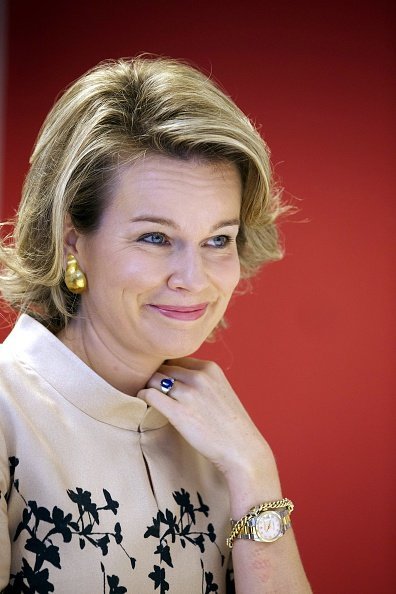
Engagement Ring ♕ Queen Mathilde
12 notes
·
View notes
Text
Philippe of Belgium

Physique: Average, but in a "I can command your respect and your heart" kind of way Height: 6' 1", ideal for all sorts of "royal engagements"
Philippe or Filip (Dutch: Filip Leopold Lodewijk Maria; French: Philippe Léopold Louis Marie; born 15 April 1960 -) is the King of the Belgians, taking the throne on 21 July 2013 after his father, King Albert II, decided he'd had enough of royal duties. As the eldest child of King Albert II and Queen Paola, he's currently in a hot and steamy battle with his brother, Prince Laurent, for the title of "Most Fuckable Belgian Royal."
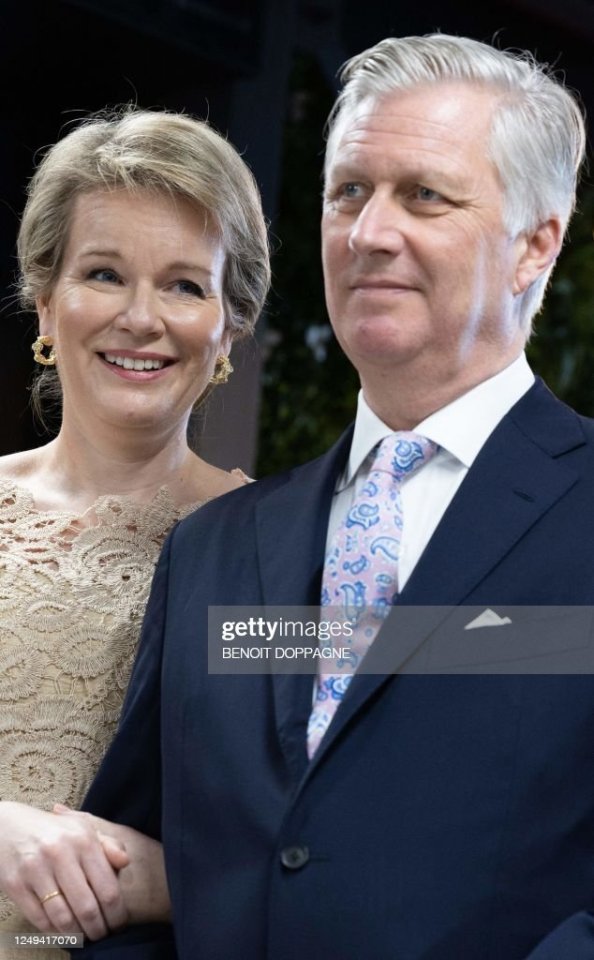
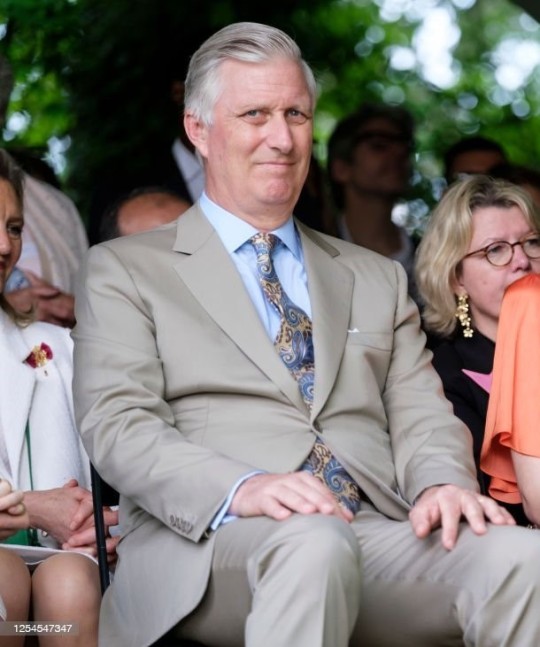



This man is the epitome of what royalty should be: tall, dark, and handsome, looking like a snack in both a suit and those naval uniforms where he's rocking the rank of rear-admiral. If perfection had a face, it would be his, especially if he's in the market for some "side action" or, dare I say, a "prince consort" on speed dial. I'm ready to expatriate to Belgium; I'll be on my knees, not just in homage to the crown but for… more personal reasons. What? Isn't that what you do when you greet royalty—bend the knee? I'm just taking it a step further.
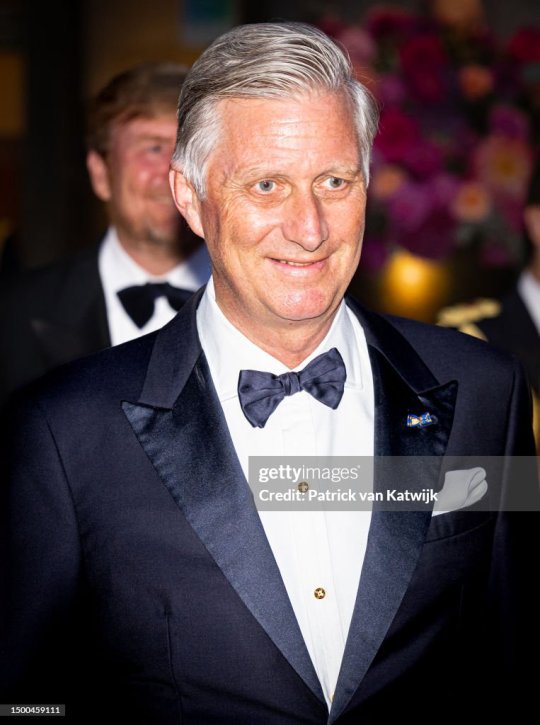




Married to the lovely Countess Mathilde d'Udekem d'Acoz, now Queen Mathilde, they've got four kids. But let's talk about those spicy rumors that King Philippe might swing the other way. Shocking? Nah, it just ups his appeal in my book. And let's be real, if we're playing the rumor game, Prince Laurent should've been the talk of the town, not Philippe.


In his downtime, he's not just ruling the country; he's also into reading, jogging, and kite surfing, which gives him that athletic edge. Plus, he plays the piano and paints, which means he's got the hands of an artist and the stamina of an athlete—perfect for… well, you know.

I haven't done much research, I confess. All my "research time" was spent imagining him "knighting" me with something far more personal than a sword.
29 notes
·
View notes
Text
Review of a history video presented by Mathilde Larrère on the women of the French Revolution
Today, I will allow myself to critique a serious historian (don’t get me wrong, her work is generally quite good, although not on the same high level as Jean-Clément Martin, Hervé Leuwers, or Dominique Godineau). But I believe it's an important exercise to critique even serious historians.
In this episode, Mathilde Larrère was criticizing the terrible episode of Secrets d’Histoire titled Les femmes dans la Révolution (Women in the Revolution). I want to clarify that Mathilde Larrère herself said she was simplifying things, which is understandable for a video that had to fit within 13 minutes at most (that’s why I’m not a fan of this format; I would have preferred an hour and 20 minutes or an hour and 30 to deliver quality content, rather than 13 or 15 minutes, where even the best historians would only be able to provide a shallow overview of the topic).
Let’s say the first few minutes were fine. But then, when she started addressing why only certain types of women from a specific political group were covered (namely Manon Roland, Charlotte Corday, Germaine de Staël, and Olympe de Gouges), it became less convincing. First, I would like to point out that Théroigne de Méricourt, who was mentioned in this terrible show presented by Stéphane Bern, is not brought up by Mathilde Larrère, which would have clarified her character better.
Théroigne de Méricourt was a feminist revolutionary, but above all, she was a supporter of reconciliation between the Girondins and the Montagnards. Often, she is wrongly portrayed as a supporter of Brissot and as someone who disliked the Montagnards.
Anyway, Mathilde Larrère says that the four women—Manon Roland, Charlotte Corday, Germaine de Staël, and Olympe de Gouges—were all advocates of liberalism and implies that they were somehow on the same side (clarifying that by "liberal" she does not mean Girondins). I would say no. Germaine de Staël supported a constitutional monarchy and believed that the king’s veto power was too limited, and that the monarch should have more authority. She approved of the massacre at the Champ de Mars. Manon Roland, on the other hand, was a republican, working with many others toward the downfall of King Louis XVI (her letter attests to this, and she disapproved of the Champ de Mars massacre, offering her house as a refuge for certain republicans). According to her memoirs, she sheltered the Roberts during the horrible shooting on the Champ de Mars, which was a repression of citizens. Additionally, Manon Roland never fled; she stayed until the end with an incredible sense of honor and courage that, in my opinion, Germaine de Staël lacked (I admire Manon Roland, even though she is not in my top 20 favorite revolutionaries and I don’t share much of her political ideas). So, it is clear that we are talking about two different categories of people.
The same goes for Olympe de Gouges. While she remained a royalist, she was much more socially engaged than Germaine de Staël, as shown by her Declaration of the Rights of Woman and the Female Citizen. Even though she dedicated it to the queen, she didn’t hesitate to publicly condemn Louis XVI’s high treason (although she wanted him to be spared and even offered to defend him). Moreover, Mathilde Larrère claims that Olympe de Gouges supported property-based suffrage, but historian Antoine Resche, in his mini-biography on Olympe de Gouges, asserts that she rejected property-based suffrage (could someone please tell me which claim is true?).
In short, it’s all much more complex. As for Corday… I’ll refrain from commenting, but I think you can all guess what I’m thinking. Maybe I’ll write a post about her one day.
Then Mathilde Larrère mentions other women who were not discussed in the episode, such as Pauline Léon, Claire Lacombe, and Marie-Sylvie Audouin.
However, she refers to these women as ultra-revolutionaries (true), but also as Hébertistes (in the case of Sylvie Audouin, daughter of the Hébertist mayor Pache and wife of a Hébertist, François Xavier Audouin, this may be true—although I don’t have much information about her, as you can see in this request post: https://www.tumblr.com/nesiacha/762707569912496128/request-for-information-on-the-revolutionary?source=share). But this is not at all the case for Pauline Léon or Claire Lacombe. These two women were part of the Enragés faction. The Exagérés (or Hébertistes, although I dislike the term just as I dislike the term "Dantonistes") and the Enragés share common points, notably that the Exagérés took over their petition (a clear case of opportunism on the part of the Exagérés regarding the Enragés). Both groups are considered ultra-revolutionary, but they had significant differences, which led them to conflict. The Enragés were wary of many forms of power, to the point that they only held key positions in their sections, especially in the Gravilliers section, while the Exagérés believed in a system of representation, and many Exagérés held key roles (Vincent in the War Ministry, Pache as mayor, Hanriot in the National Guard, Chaumette in the Commune, and Hébert as a deputy, etc.). I’m shortening a bit, but you get my point. So, Pauline Léon and Claire Lacombe were part of the Enragés group. On the Hébertist side, Sophie Momoro could be mentioned (although she played more of a supportive role for Momoro, much like Lucile Desmoulins did for Camille Desmoulins), but as for Marie-Françoise Hébert, I am unsure of her ideas. As for Marie-Angélique Lequesne, who was married to Ronsin, I only found in the memoirs of Jean-Balthazar de Bonardi du Ménil that she frequented ultra-revolutionary circles and she dressed up as an Amazon, so I wouldn’t take that as a certainty. So far I have only found information about her political life from the time when her second husband Turreau became ambassador to the United States.
I would also have liked to see other women from this period mentioned who, while not Girondins or considered ultra-revolutionaries, supported the Montagnards, such as Simone Evrard, Albertine Marat, or Rosalie Jullien (the list goes on).
Additionally, I’d like to address another point Mathilde Larrère made when she talked about the opposition between the Girondins and the Montagnards. She mentioned that the Girondins rejected the Maximum (price controls) and said that the Montagnards accepted it. However, in reality, the Maximum was only adopted under pressure from the Exagérés; without this, it probably wouldn’t have been implemented. Regarding slavery, Mathilde Larrère explained that the Girondins didn’t abolish slavery and that it was the Montagnards who did. Now, I know there were Montagnards who supported the abolition of slavery (Danton, Abbé Grégoire, Jean-Paul Marat—the list is long), but there were also Girondins who were in favor of the abolition of slavery, albeit gradually, such as Brissot or Sonthonax, who was sent to Saint-Domingue (now Haiti) specifically for that purpose. In fact, I invite everyone to check out the excellent post by @anotherhumaninthisworld on the ambiguous remarks Robespierre made about the abolition of slavery, especially when used to attack the Girondins or Danton: https://www.tumblr.com/anotherhumaninthisworld/763024488758706176/at-this-point-i-wonder-if-he-even-wanted-to?source=share.
Here is the link to the video ( it's in french):
#frev#french revolution#history#france#women's history#pauline leon#claire lacombe#olympe de gouges#manon roland#germaine de stael#charlotte corday#albertine marat#simone evrard
5 notes
·
View notes
Text









Where are we going Mathilde….Matera in Italy ?

No, dear ….James is standing there in an ambush to shoot you, he still hasn't accepted our engagement. So I told my parents we were going to Italy….

And we are not going to Italy….Lucky you got the "Schining",which warned you

You also have the Schining dear, you should use them more.
Anyway, we're not going to let those 2 ruin our engagement trips. Besides, I used to go to Matera every year with my mother, I've seen that city a bit tired, honestly….That's why we're going to another beautiful and sunny country and we're starting in the capital, where I've only been once
That's why I gave our original hotel tickets in Matera to my best friend and her young family, so my parents will definitely have company there
and so, in Matera, Italy

Caramia Mr. Bond and Mrs. Swann. Your daughter was kind enough to give us her tickets for the hotel here
Where is our daughter herself with her fiancé?

We're sorry, Mr. Bond, but we're not allowed to tell you that, she explicitly said that if we wanted her tickets for this holiday

Moreover, we are also very good friends with her fiancé Safin and we were invited to their wedding. So you can't shoot him. So just accept their engagement
But we will keep you good company, Mr. Bond and Mrs. Swann, and have a nice holiday together… We promised her that

Caramia, We have all the time in the world darling ❤️❤️
Meanwhile, somewhere much further south in Europe


Can we start a family as soon as possible Mathilde, Our friends Morticia and Gomez Addams already have a daughter together

Please be patient until after our wedding next year when we will start our family and I want at least 4 children with you
Do not forget the words of your father-in-law
"We Have Al The Time Of The World"

I love you ❤️

I love you too❤️


Sunny greetings from Athens, the capital of Greece where Count Lyutsifer and Countess Mathilde are on their engagement holiday

Lyutsifer en Mathilde ❤️❤️
#lyutsifer safin#mathilde bond#lyutsifer safin & mathilde swann#rose the hat#the adams family#don't shoot my fiance daddy#the safin family#lytsifer and mathilde engaged#team safin#team mathilde#count safin#countes mathilde#rose the hat is mathilde vampire name#the schinning
6 notes
·
View notes
Note
How does the work of the Begium Royal Family compare to the British Royal Family? As in number of engagements and all that.
For example, we all say that W&C are a bit work shy, but Mary and Frederick aren't much better. What about Philippe and Mathilde? They are king and queen, not dirst in line to the throne and their kids are older, I know that makes a difference, but theh do seem to work more...
If this ask is not your cup of tea feel free to not respond, we can't all find the same topics interesting
According to Ufo No More, Philippe worked 150 days in 2023 and Mathilde 101. For comparison William worked 114 days and Catherine 92.
Comparing it to the BRF is always tricky though since they do things differently so in comparison with other King and Queens - Felipe worked 194, Letizia 123, WA 122, Maxima 109.
4 notes
·
View notes
Note
Tell me about Jenna and her crushhh
What's their dynamic like? Are they endgame?
helloooo thanks for dropping by!
jenna’s (mostly aesthetic) crush is on the IT girl at their small high school/metro (do they even have a working one? probably not) area, chloe mathilders.
here’s a sim of her LMAO she’s black also :3

jenna, chloe and carlos have all known of each other since elementary school, but they ran in different circles. while jenna was wandering off of school grounds during recess, dragging carlos after her, chloe was in the classroom playing with dolls and socializing with the other kids. middle school hit and chloe became athletic and tried almost every sport and jenna would be wandering the separate field with carlos identifying trees and magical creatures that lurked in the bushes. other kids ostracized jenna because she is So Visibly Autistic that it’s impossible to hide, but chloe never really engaged. she didn’t necessarily stick her neck out but she just didn’t pay attention to jenna and carlos or go out of her way to be cruel to them.
jenna’s (aesthetic) crush on chloe probably started when they were around like 5-6th grade and this is around the same time that jenna got into burlesque and pinup models. for those that don’t know that’s jenna’s Huge special interest, especially if they’re 20s themed or closer to the og style and a prominent feature in many models is obviously the beauty mark. jenna’s crush truly developed because she saw that chloe had a beauty mark, associated it with her special interest, and has been kind of quietly admiring her for years. it’s not your traditional kind of crush because jenna isn’t like In Love with chloe; she doesn’t go out of her way to learn about her or what she does, or who she spends time with. nor does she try to get noticed by her at all. she just likes looking at her LMAO.
so for a very long while up until high school there was just nothing. no relationship no dynamic, just a person you’ve known your whole life via proximity but never any deeper than oh you exist. and then chloe ends up needing their help with a supernatural Incident involving her mother (i still have to figure out what exactly the issue is).
MIND YOU: no one in this wip knows about magic sans for the mcs and whatnot so magic existing at ALL is news to chloe. sure, she heard jenna talk all the time about how her moms were witches and shit like that (bc jenna is incapable of lying) but like everyone else she just thought jenna was weird — she didn’t think it warranted jenna being picked on BUT she did just think she was odd. so magic existing? crazy. she doesn’t know who to go to, cuz her popular friends would no way in HELL believe her if she said that some magic bs happened. so she ends up going to jenna and carlos.
carlos, is immediately suspicious of her intentions (bc he protecc) but jenna as always is pretty happy to help her. even probably says something so straightforward like “well, carlito, we have to help her. i mean, how often does your crush come up to you and ask for help?” and chloe is very HUH?????? but to be fair so so much of chloe in this story is her being like this is fucking insane and carlos is like yeah welcome to the club.
chloe ends up gaining a respect for carlos and jenna and ends up getting surprisingly close to the two of them. but it doesn’t mean she gives up or shuns her friends, though she is more vocal about people leaving jenna and carlos alone.
in terms of endgame, they’re not, never become an official couple. chloe is straight, and jenna having being autistic and ace as modifiers for being a mspec lesbian makes her not really like apt to pursue a traditional romantic relationship. she, chloe and carlos do get very close. (i can see chloe confiding in carlos and saying honeslty sometimes i wish i could be into girls and be in this world of y’all’s. i just don’t know if i’m cut out for it and carlos gives good advice etc etc). but i mean, even at the end of the day, jenna’s eventually gonna become a virtually immortal witch and immortalizes carlos as her familiar so even if she and chloe were a thing chloe would end up dying unfortunately (in the long run).
N E WAY tho, real end game is carlos and jenna lmaooo.
8 notes
·
View notes
Text
Eight questions for nine people
tagged by @lindadarnell 🩷✨
Last song I listened to: Early Morning Waiting - Alex G
Favourite colour: Pink! 🩷 Newer fave is green. 💚
Last TV show or movie I watched: The Vanishing/'Spoorloos' (1988)
Currently Watching: Abbott Elementary S2
Sweet, savoury, or spicy?: All, depends on what I'm craving.
Relationship status: Engaged
Current obsession: My plants! Faves atm are my hoya mathilde splash and dischidia ovata. 🪴
Last thing I Googled: The Vanishing (1988)
tagging: @mike-mills, @trainstationgoodbye, @slayerbuffy, @moonlight, @cindylouwho, @losthavenmine, @hayscodeviolation, @artemiese, @chapellroan (if you want to!)
12 notes
·
View notes
Text
Victor Hugo’s speech in support of Napoleon, and his support to lift the ban on the Bonaparte family
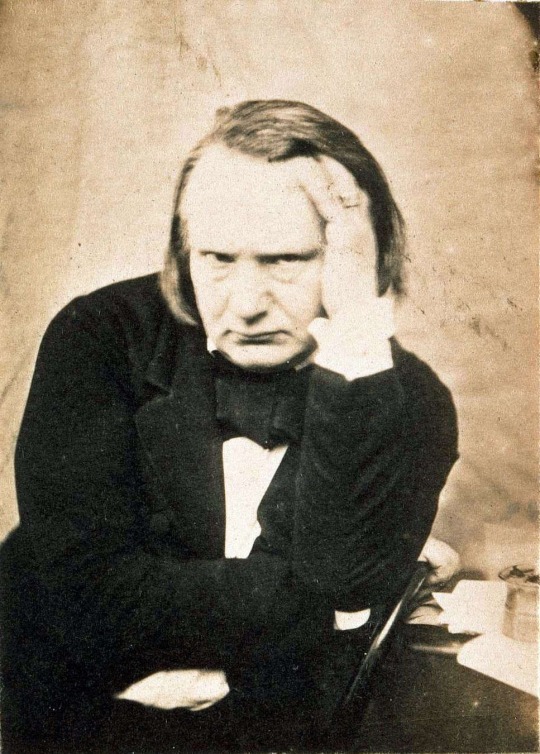
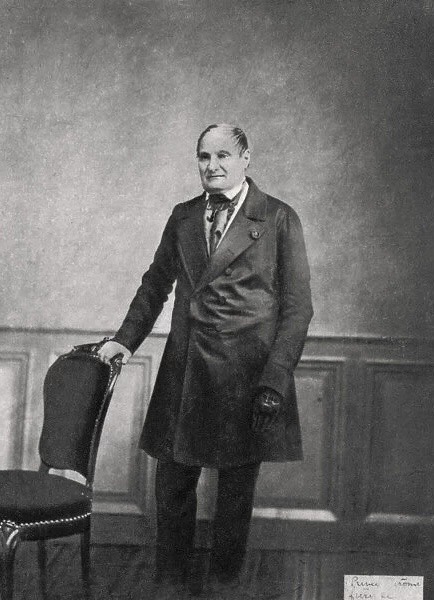
(Left: Victor Hugo, Right: Elderly Jérôme Bonaparte)
Excerpt from Jonathan Beecher, Writers and Revolution: Intellectuals and the French Revolution of 1848
—————-
Hugo was fascinated by the Praslin affair and wrote about it at length in his journals. But he was more deeply engaged by another issue brought to the Chamber of Peers in June, 1847 – the petition of Napoleon’s only surviving brother, Jérôme Bonaparte, who sought the repeal of the law exiling members of the Bonaparte family. “I declare without hesitation,” Hugo told the peers. “I am on the side of exiles and proscrits.”
Не obviously could not know that he himself was to spend almost two decades in exile. But one exile who mattered to Hugo in 1847 was the first Napoleon. In his speech to the Chamber of Peers Hugo contrasted the pettiness and corruption of the July Monarchy with the grandeur of Napoleon’s Empire:
As for me, in witnessing the collapse of conscience, the reign of money, the spread of corruption, the taking of the highest places by people with the lowest passions, (Prolonged reaction) in witnessing the woes of the present time, I dream of the great deeds of the past, and I am now and then tempted to say to the Chamber, to the press, to all of France: “Wait, let us talk a little of the Emperor. That will do us good!” (Intense and profound agreement).
After this speech, the elderly Jérôme Bonaparte personally thanked Hugo; and his daughter, the Princess Mathilde, invited him to dinner. Hugo was now regarded in some quarters as a Bonapartist.
—————-
[Italics in original]
“La Famille Bonaparte,” OC Politique, Laffont, 138-139.
#victor Hugo#Jerome Bonaparte#jerome#Napoleon’s brothers#Napoleon’s family#napoleon#napoleonic era#napoleonic#first french empire#napoleon bonaparte#french empire#19th century#france#history#bonapartism#bonapartist#1848 revolutions#1840s#1847#Hugo#writers and Napoleon
17 notes
·
View notes